
 Flash News
Flash News
Ceno Klosi with over 800 stolen votes, Balluku finds the reason is the tiredness of the counters
"Fast & Furious" in the former Block, police chase an Audi Q8, 4 cars collide
Car hits two tourists on a motorcycle in Fushe Arrëz, one of them dies
Serious accident in Thumanë, one dead, 3 injured
Durrës Court suspends the director of Pre-University Education from duty
Refugee camp in Gjadër, DW: There are no conditions, the containers are not suitable

The sun is scorching in the interior of Albania, it is hot at the old military airport in Gjadër, the temperature is over 30 degrees. A fire is seen on a nearby hill, plumes of smoke rising into the blue sky.
At the construction site of the Italian camp for asylum seekers in Gjadër, work is currently stopped due to the heat, as stipulated by the Italian labor law. Italian laws are also applied in Gjadër, because Albania has given that country a military zone. The construction of a container camp for asylum seekers did not even require an Albanian construction permit.
3000 migrants per month
Italian law currently applies to construction workers - and in the future it will apply to more than 3,000 migrants and refugees a month whose claims must be processed here, meaning a decision must be made on whether they are eligible for asylum or not .
In the future, Italy will transfer to Albania the persons rescued in the area of international waters in the Mediterranean. First, in the port of Shengjin, where a small camp is already ready to receive asylum seekers. Those people have to register there, have their fingerprints and other data taken - before they are transferred to Gjadër.
And who will move to Albania? According to the Embassy of the Republic of Italy in Tirana, the decision for this should already be taken in the emigrant rescue ships. Depending on the country of origin and the health status of the migrants and refugees, it will be decided who will be transferred to which camp.
Short stay
Human rights organizations such as Amnesty International criticize that most migrant rescue ships are not equipped enough to make such decisions. They claim, for example, that there is no suitable medical equipment for more comprehensive examinations of people.
In addition, as these organizations claim, many migrants and refugees do not have personal documents with them. The letters are decisive for making a decision on asylum: supposedly people from the so-called safe countries (of origin) must go to Albania, that is, from those countries with which Italy has signed an agreement on the return of immigrants. This should prevent asylum seekers whose application has been rejected from staying in the camp for a long time.
The containers in Gjadër are not suitable for a long stay anyway. Two soldier beds, two metal cabinets and four plastic chairs are the furniture that take up most of the space in them. There is room for four people in each room. Showers and toilets are located in another part of the camp.
Exception, not rule...
The camp area in Gjadër, from a legal point of view, should have the same status as border areas or transit areas at airports, as defined by law - and this is a prerequisite for the rapid approval of the procedure for the right to asylum. Asylum seekers should only be transferred to Italy in exceptional cases.
The calculation is clear: people who end up in Gjadër have no chance of getting asylum. They will probably never move to Italy again.
But the procedures themselves must be carried out in accordance with the law of the Republic of Italy. There are office containers at the entrance to the camp. According to Italian claims, they should be equipped with lawyers and judges responsible for the proceedings. Some things can be done through video conferencing, it is claimed. It is difficult to get more specific information about it, just as it is difficult to get an answer to the question: can asylum seekers be forced to stay in such a camp, that is, in a place where freedom of movement is limited?
Albanian activist Arilda Lleshi from Shengjini doubts and sees this as a violation of the rights of immigrants, which are guaranteed by the European Convention on Human Rights. The agreement is absurd and serves only the heads of the Italian and Albanian governments, Edi Rama and Giorgia Meloni, she claims. "It doesn't serve the expats and it doesn't serve our community here," says Lleshi.
Refugees and tourism
Shengjin is an ambitious tourist destination. The beach, on which there are many sunbeds in August, is located right next to the port, where the immigrants must land in the future. "There was no public discussion about this at all. We found out about it on November 5, when the agreement was signed in Rome", complains Lleshi.
Some other people in the region hope that the existence of the camp can have a positive effect on the local economy, especially in Gjadër. Italy has promised to create new jobs for local residents, for people who will work in the kitchen or as cleaners. And hundreds of Italian policemen have to be accommodated somewhere, they have to spend the night in hotels in nearby cities. The agreement between the two parties stipulates that the camp will be in operation for at least five years.
In a few weeks, the camp in Gjadër should be ready to receive the first asylum seekers. But only after the Italian authorities have given the "green light" to start work. It seems clear that Italy does not want to make a single wrong step in this camp. For Italy, it seems, Gjadra cannot be a template for camps other similar DW
Latest news





Lufta në Gaza/ Pse Netanyahu do vetëm një armëpushim 60-ditor, jo të përhershëm?
2025-07-02 21:56:08
US suspends some military aid to Ukraine
2025-07-02 21:40:55



Methadone shortage, users return to heroin: We steal to buy it
2025-07-02 20:57:35
Government enters oil market, Rama: New price for consumers
2025-07-02 20:43:30
WHO calls for 50% price hike for tobacco, alcohol and sugary drinks
2025-07-02 20:41:53






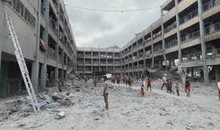
Israel agrees to 60-day ceasefire in Gaza, but many unanswered questions remain
2025-07-02 18:35:27
The weather in Germany is going "crazy", temperatures reach 40°C
2025-07-02 18:22:21

"Fast & Furious" in the former Block, police chase an Audi Q8, 4 cars collide
2025-07-02 17:59:25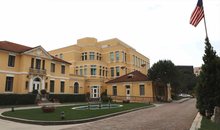
"Birth on a tourist visa? US Embassy warns Albanians: This is prohibited!"
2025-07-02 17:48:16


BIRN: Fier recount reveals vote trafficking within open political party lists
2025-07-02 16:57:19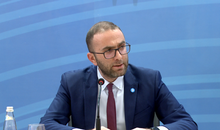

CEO and former director of 'Bankers Petroleum' arrested in Fier
2025-07-02 16:40:42
Car hits two tourists on a motorcycle in Fushe Arrëz, one of them dies
2025-07-02 16:33:23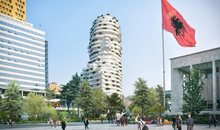



Fire at the Elbasan Incinerator Landfill, Prosecution Launches Investigations
2025-07-02 15:34:54
What you need to know if you travel to a country with active volcanoes
2025-07-02 15:33:03



EU proposes 90% reduction in greenhouse gases by 2040
2025-07-02 14:50:23
Europe is burning from the heat / Italy and France are on maximum alert
2025-07-02 14:36:52

Moscow's contradictory statements: Is the friendship with Vučić breaking down?
2025-07-02 14:21:05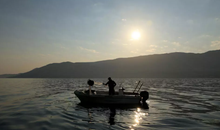
'I lost my battle': Sea warming is killing fishing in Albania
2025-07-02 14:08:35
Sekretet kimike që ndihmojnë në mbajtjen e mjaltit të freskët për kaq gjatë
2025-07-02 14:01:26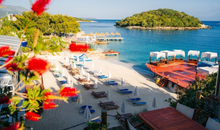

Denmark makes historic decision to make military service mandatory for women
2025-07-02 13:44:33
The appeal of the GJKKO leaves former judge Pajtime Fetahu in prison
2025-07-02 13:30:20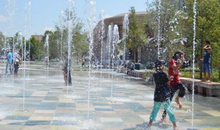
Productivity losses could reduce GDP by 1.3% as a result of extreme heat
2025-07-02 13:21:04
He abused his minor daughter, Zamir Meta is left in prison
2025-07-02 13:04:04

Waste burning in Elbasan, Alizoti: They are poisoning people and stealing money
2025-07-02 12:48:39
Civil disobedience continues in Serbia, dozens of people detained
2025-07-02 12:40:32
Rama's government was born under the sign of garbage and will end like this
2025-07-02 12:28:09
Water prices increase in the municipalities of the Elbasan region
2025-07-02 12:13:38
Civil disobedience continues in Serbia, what is happening in Belgrade?
2025-07-02 12:07:44
Serious accident in Thumanë, one dead, 3 injured
2025-07-02 11:54:42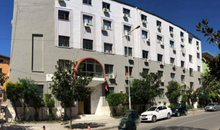
Durrës Court suspends the director of Pre-University Education from duty
2025-07-02 11:49:27
Plenary session on Thursday, what is expected to be discussed
2025-07-02 11:36:43
Europe is burning from heat waves/ What is the 'thermal dome' phenomenon?
2025-07-02 11:26:25
Wanted by Italy for murder, 45-year-old arrested in Vlora
2025-07-02 11:19:31
Fire situation, 28 fires reported in 24 hours, 2 still active
2025-07-02 11:13:20
"Buka" file, preliminary hearing for Ahmetaj postponed to July 17
2025-07-02 11:03:30
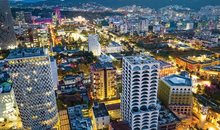

Baçi: Belinda Balluku and Ceno Klosi, the most dangerous "gangs" in Fier
2025-07-02 10:32:09
Zamir Meta, suspected of sexually abusing his daughter, arrives in court
2025-07-02 10:21:33

Trump: Israel has agreed to a 60-day ceasefire in Gaza
2025-07-02 10:01:55
Fire continues at Elbasan landfill
2025-07-02 09:51:13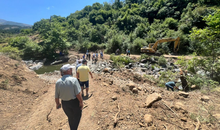

Dates to note during July, important events will occur
2025-07-02 09:31:45
The hearing for Jorgo Goro's claim is postponed
2025-07-02 09:24:19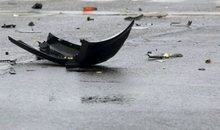



Foreign exchange, the rate at which foreign currencies are sold and bought
2025-07-02 08:42:31

52% of pensioners did not receive full pension in 2024
2025-07-02 08:27:18
Horoscope, what do the stars have in store for you today?
2025-07-02 08:13:36
Hot weather, Wednesday brings high temperatures
2025-07-02 07:59:16
Morning Post/ In 2 lines: What mattered yesterday in Albania
2025-07-02 07:46:15
Heatwave sweeps across Europe, Spain and England record hottest June ever
2025-07-01 22:57:41






Golem and Qerret without water at the peak of the tourist season
2025-07-01 21:09:32

Euractiv: Italy-Albania migrant deal faces biggest legal challenge yet
2025-07-01 20:53:38
BIRN: Brataj and Fevziu victims of a 'deepfake' on Facebook
2025-07-01 20:44:00

Vlora by-pass, work delays and cost increases
2025-07-01 20:24:29



Milan are expected to give up on the transfer of Granit Xhaka
2025-07-01 19:41:25

